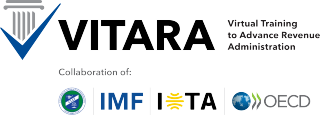Posted by Tamas Kulcsar[1]
On July 1, the Strategic Management module of the VITARA (Virtual Training to Advance Revenue Administration) online course became available for tax administrations across the globe. Almost a thousand participants (mostly senior managers and executives from developing countries) enrolled in the inaugural class.
VITARA is an exciting new initiative from the IMF and its partnering international organizations (the Inter-American Center of Tax Administrations, CIAT), the Intra-European Organisation of Tax Administrations, IOTA), and the Organisation for Economic Co-operation and Development, OECD). It aims to help developing country tax administrations reach the goals of the Addis Tax Initiative, succeed in Domestic Revenue Mobilization (DRM), and meet their Sustainable Development Goals (SDGs). The importance of these objectives was recently highlighted by IMF Managing Director Kristalina Georgieva at the UN High Level Political Forum on Sustainable-Development.
To deliver the SDGs, developing country tax administrations need to build their capability in key areas ranging from institutional arrangements to core tax administration functions. The COVID-19 pandemic has further exacerbated existing pressures on developing country tax administrations and a return to pre-pandemic revenue levels is a priority. While advanced economies have reached a turning point and begun their recovery, the impact of COVID-19 will continue in developing countries. Many face uneven and slow recovery. Furthermore, the crisis has had a devastating impact on developing countries’ revenues while public deficit and debt levels are surging due to spending on health care and social programs as well as stimulus packages.
For international organizations and development partners, effectively delivering information, knowledge, and advice on international good practices on tax administration is key to help these countries safeguard and boost tax revenues. Online courses are effective vehicles to deliver knowledge and training under the current global circumstances, especially if travel restrictions and lockdowns remain and hamper in-person capacity development activities.
VITARA complements the four partnering organizations’ capacity development and training efforts. Once fully developed, the course will offer a structured curriculum covering almost 20 high-priority topics that span the key components of good tax administration. Addressing issues from strategic management, organizational arrangements, human resource management, reform management, information technology and data management, compliance, and enterprise risk management, VITARA provides a comprehensive program.
The modules highlight international good practice on each topic and will provide foundational learning for the participants, mainly senior and executive-level professionals from developing countries. VITARA’s modular structure means that the modules can be followed individually, each module providing sufficient knowledge on a topic. Thus there is no need for participants to follow all modules in the curriculum.
The first topic on the VITARA course, Strategic Management, is crucial. Strategic management helps tax administrations build a strong foundation for their future. It assists them in setting clear objectives and a roadmap to reach those objectives. A strategically managed tax administration is more proactive, innovative, and less resistant to change. It identifies and addresses future risks more effectively and operates more efficiently.
At a broad level, strategic management is about defining the path which top management wants the organization to follow, developing a strategic plan to get there through defined operations and actions, evaluating results, and adjusting the plan when necessary along the way. Strategic management is a cyclical, end-to-end process of managing the organization to achieve the desired results.
The roll out of VITARA is continuing with two new courses whose registration has just opened up. Both address the challenges that developing countries face in designing and implementing tax administration reforms.
In practice, reform means making fundamental changes to a tax administration in areas including its organizational structure, core functions, legal framework, IT systems, ways of interacting with taxpayers, and HR practices. For tax administrations, reform is a fact of life since they operate in a dynamic environment that demands that they adjust continuously to meet the ever-expanding needs and expectations of the government and citizens. Success requires strong leadership and specialist management practices to ensure reforms are delivered on time, within budget, and of acceptable quality.
To help tax administration leaders embark on a reform journey, the course Reform Management Fundamentals: Setting up a Reform Program explains key concepts in developing a tax administration reform program, and basic requirements for managing its implementation.
Building on the first course, a follow-up course Reform Management Specific Topics: Managing a Reform Program focuses on the implementation of reforms and introduces tools and methods in planning, monitoring and reporting key deliverables, approaches to resource reforms and risk management, successful change management practices, as well as the importance of post-implementation evaluation.
VITARA is funded by the Revenue Mobilization Thematic Fund.
[1] Fiscal Affairs Department, IMF.
Note: The posts on the IMF PFM Blog should not be reported as representing the views of the IMF. The views expressed are those of the authors and do not necessarily represent those of the IMF or IMF policy.








